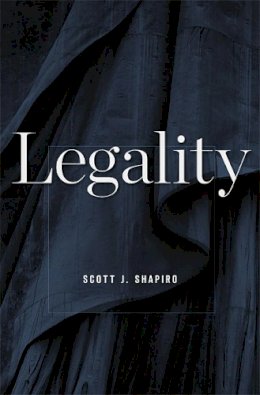
Legality
Scott J. Shapiro
What is law? This question has preoccupied philosophers from Plato to Thomas Hobbes to H. L. A. Hart. Yet many others find it perplexing. How could we possibly know how to answer such an abstract question? And what would be the point of doing so? In Legality, Scott Shapiro argues that the question is not only meaningful but vitally important. In fact, many of the most pressing puzzles that lawyers confront—including who has legal authority over us and how we should interpret constitutions, statutes, and cases—will remain elusive until this grand philosophical question is resolved.
Shapiro draws on recent work in the philosophy of action to develop an original and compelling answer to this age-old question. Breaking with a long tradition in jurisprudence, he argues that the law cannot be understood simply in terms of rules. Legal systems are best understood as highly complex and sophisticated tools for creating and applying plans. Shifting the focus of jurisprudence in this way—from rules to plans—not only resolves many of the most vexing puzzles about the nature of law but has profound implications for legal practice as well.
Written in clear, jargon-free language, and presupposing no legal or philosophical background, Legality is both a groundbreaking new theory of law and an excellent introduction to and defense of classical jurisprudence.
Product Details
About Scott J. Shapiro
Reviews for Legality
Thom Brooks
Times Higher Education
It cannot be doubted that Shapiro’s book, which clarifies and advances analytical jurisprudence, is bound to be a classic text.
Ekow Yankah
Jotwell
[Legality] is a sympathetic, accessible, and highly readable exposition of the theories that have preceded it. It is now one of the best single-authored introductions to the subject. It is also a significant contribution. Moreover, it is an apologia for the subject itself, and for the method of conceptual analysis as a way of uncovering the nature and grounds of law… Both as a defense and example of analytic jurisprudence…this book is unrivalled.
William A. Edmundson
Jurisprudence
This book is…imaginative, incisive, fair to interlocutors, and written with elegance and wit… It is essential reading for philosophers of law.
Mark C. Murphy
Law and Philosophy
I feel confident that Legality is one of the very best books in general jurisprudence in many, many years… I suspect that Legality will become a standard work for students of law and philosophy… Everyone who engages in the academic study of law should read Legality—it is that important.
Lawrence B. Solum
Legal Theory blog
Rich and vibrant with jurisprudential ambition… There are lots of riches in Scott Shapiro’s book… I have not been able to convey how well this book is written or how much light the author is able to shed along the way on various issues in the philosophy of law… It shows that the idea of planning can indeed cast light on the problems of jurisprudence without necessarily blinding us to other analogies and other sources of insight.
Jeremy Waldron
Michigan Law Review
Scott Shapiro’s Legality is a rich and ambitious discussion of law’s fundamental nature. Almost every page is provocative, touching upon many of the most interesting, complicated and controversial areas within this area of inquiry.
Stefan Sciaraffa
Oxford Journal of Legal Studies
Legality makes a contribution to the field that no student of jurisprudence can ignore.
Judith Baer
Political Science Quarterly
Shapiro has produced a work of enduring significance.
Frederick Schauer
Yale Law Journal
Highly recommended.
Choice
A strikingly original, highly accessible, and well-worked-out theory of the nature of law. Shapiro is on the positivist side, but a tremendous strength of the book is that it engages deeply and sympathetically with natural law and anti-positivist theorists. Everyone serious about the philosophy of law needs to read this book.
Mark Greenberg, University of California, Los Angeles An outstanding contribution—almost certainly the most important book on its topic since Dworkin’s Law’s Empire. Legality develops a novel and forceful account of the nature of law, but the engagements with other prominent accounts are so resolutely fair and powerfully presented that, were I to suggest one book for someone wanting to understand contemporary debates in jurisprudence, this would be it.
Arthur Ripstein, University of Toronto
